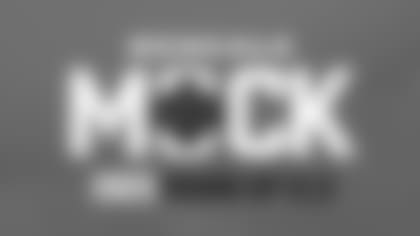Closing out his 21st season with the Bengals as the NFL's longest-serving special teams coordinator, Darrin Simmons is also finishing his fourth season as Zac Taylor's assistant head coach.
Bengals.com senior writer Geoff Hobson forced a fair catch this week and held up Simmons long enough to ask him about issues ranging from the state of the team, to the emergence of his group that has hung in the NFL's top ten rankings despite its youth, and the lack of interest in hiring specials teams coordinators as head coaches.
The conversation:
GH: The Bengals special teams came into the Kansas City game ranked sixth in the NFL. Given how young you are, is this your best coaching job with the Bengals?
DS: With the new kickoff rules, that's hard to justify or hard to judge. Just because we haven't covered nearly as many kickoffs. We haven't had as many kickoff returns. I think the kickoff returns we had, we've had pretty good plays on. We just haven't had an opportunity enough to do it. It's hard to say.
GH: There have been different standards down through the years on how special teams coaches have ranked each unit in the league. How have you done it this year?
DS: The NFL stats that Elias provides, the 12 categories: Punt return, kickoff return, gross punting, net punting, field-goal percentage and your punt coverage, your kickoff coverage, the opponent gross punting, the opponent net punting, the opponent field-goal percentage and kickoff return and kickoff drive start. We're at ninth and looking to improve Sunday.
GH: Your rookie punter Brad Robbins was talking about how he needs to just trust the guys around him and get the ball down field.
DS: He's got to react more and learn not to overthink things. He's got to rely on muscle memory for a lot of stuff, too. That's what all specialists have to do. Being good at relying on muscle memory. It's got to be better. He's 30th in the league in gross punting and that's got to be better. It's consistency. A lot of that is consistency. He didn't get off to a great start. Eleven punts in the first game for 38, 39 yards. That's hard to recover from. First game, wet field, but it is what it is.
GH: Are you going to bring in another punter in the offseason?
DS: That's all stuff that is going to be looked at.
GH: The big picture here for a moment. The fact you've been in the top ten most of the year, you think the injured Tycen Anderson can be a premier player, and these guys being so young, I would think this has to be a huge accomplishment for you.
DS: I feel proud of what we've done. We scored once. To get a lot of these younger guys good and buying in is a feat in and of itself. But that's what we're here to do. Help improve those guys and get these guys to believe in something and go out and accomplish something and they've done that. Some of that credit goes to some of our veteran players. Like Akeem Davis-Gaither, Markus Bailey. Even guys on the practice squad. That's the reason we kept Mike Thomas. To help with that stuff.
GH: How did Mike help you?
DS: Just enlightening some of the younger guys. There's so much work to be done outside the meeting room with these guys. In the locker room, or at breakfast, or at lunch. Mentoring the younger guys and what it should be and what it is to be a pro.
GH: People don't talk about Akeem and Markus because they don't play on the outside.
DS: They play on the inside. They play hardcore minutes for me and hardcore plays for me and they're both very, very productive players that we need back.
GH: I can't remember a time you've been this good so young.
DS: I think it sheds a positive light. It was like having all new specialists. New returners. New punter. Second-year snapper. Third-year kicker. It kind of re-charges you, re-vitalizes you a little bit. I don't know if you get in a rut. The expectation of having veteran players is you can do a lot of different things with those guys. But sometimes less is better. Allow these guys to play fast and execute at a high level. I believe it's as fast as we've ever been. We're exceptionally fast. The really good groups I've had in the past have been fast. And the years a little lesser, we weren't as fast.
GH: You were ranked No. 1 in 2019 and that wasn't a real burner group.
DS: We had veteran group. The Clayton Fejedelems, the Cethan Carters, Brandon Wilson, Tony McRae.
GH: You've been to the playoffs nine times. The Super Bowl. Two AFC title games. That must make this week rough.
DS: It sucks. It eats your heart out. Worse than I remember it. You get used to the other way. You get used to winning and winning in the playoffs. Not just making the playoffs, but winning in the playoffs and to not make the playoffs is gut-wrenching.
GH: With 12, no one has attempted more 50-yard field goals than Evan McPherson this season. He's made seven, tied for second most. You say when you get to the 40, you automatically say to yourself, "Field goal range."
DS: We've attempted long field goals with him. More so than at any point in my time here. I think we trust he can make those. We don't even think twice about it. Just send him out there and let him go. He's been solid. I think he's kicked off pretty well this year. He's kicked off probably better than in his other years, more consistent.
DS: I think he had a more difficult time last year. If you remember, we changed snappers on him when Clark (Harris) got hurt. And then midway through the season we changed the punter, so he changed his holder. It affects him.
GH: The operation with Robbins holding and Cal Adomitis snapping seems smooth this year.
DS: I think it's good. They do a fine job. They're both very capable.
_GH: Are they in a class yet with Kevin Huber and Clark Harris? _
DS: I don't know about that. They have a lot of battles to fight before they're in that crowd.
_GH: The 49ers went 4-12 after they went to the Super Bowl. After the Ravens went 14-2 in 2019, they hit a speed bump. Is this season just the growing pains of an elite team? _
DS: I like to think we're elite. But we have to go prove it. It was difficult for us to get into a flow. Everything revolves around our quarterback and what he does. We manage games around what he does. When he's not right to start the year, it makes things more difficult. I'd like to think this is a blip. Dating all the way back to preseason, we just never were able to get into a flow and hopefully that's a blip on the radar. And we get him back and healthy. We have to play better around him, too.
GH: You've talked this season about how good of a head coach Zac is and how well he tweaks and adjusts the schedule and how you are now doing some things differently than when he first got here. What are some of those changes that stand out?
DS: We've changed the way we handled the offseason. We do less in the offseason probably than most teams do. But I think that puts us in better position late in seasons. We're fresher late in the season to do the things that we want to do. Doing less in the offseason is one of those things. Maybe doing less in training camp is one of those things.
GH: Some may argue that's a reason for the slow starts.
DS: There's an argument for that. But there's also an argument, it's not how you start, it's how you finish. We like to think we've finished pretty strong the last couple of years. So much about team success is the health of the players, too. We've been able to stay relatively healthy over the last couple of years. It hasn't quite been the case this year. We've had more guys dinged.
GH: Special teams coaches don't seem to get love this time of year for a head coaching job. I can't understand it. No other assistant coach deals with nearly every player like teams coaches do. And a teams coach is used to dealing with situations.*
During your tenure, I think only three have become NFL head coaches. John Harbaugh in Baltimore. Joe Judge with the Giants and Rich Bisaccia wasn't retained as the interim in Vegas. You've had one interview and that was here in 2019 before Zac got the job. Only three. Is that still perplexing to you after 21 years?
DS: It certainly is. I also think when those opportunities come up, guys have to make good. I think if things hadn't gone as well for one of these special teams coaches as the head coach, they're quick to pull back. And probably not rightfully so. I think it is perplexing there haven't been more opportunities. There are a lot of really, really goood special teams coaches who really know how to manage the team and manage players who I think would be tremendous head coaches.
I don't know if (Judge) really got a fighting chance in New York. When Rich got his opportunity, he took his team to the playoffs. Yet the Raiders didn't think enough of him to hire him. I think they made a mistake. It is perplexing. You'd like to see those opportunities come up more than they have.
GH: Is it because special teams is playing second fiddle to offense and defense?
DS: That's probably part of it.
GH: You're 21 seasons in. How do you see your career?
DS: I see myself fighting every day to prove myself like I did in year one. That's what I see. No different than the players. They play for respect and try to earn the respect of their peers. And the coaches. I still try to do the same thing.
I feel like on a daily basis somebody's out there trying to get my get my job or to beat me. That drives me on a daily basis to try and stay out in front of those guys. I'd like to think I've been through about every scenario, about every situation you could possibly go through. I'd like to think my experience could carry me through a lot of stuff. But again, it's always about the grind. It's about the struggle of trying to stay out in front.







